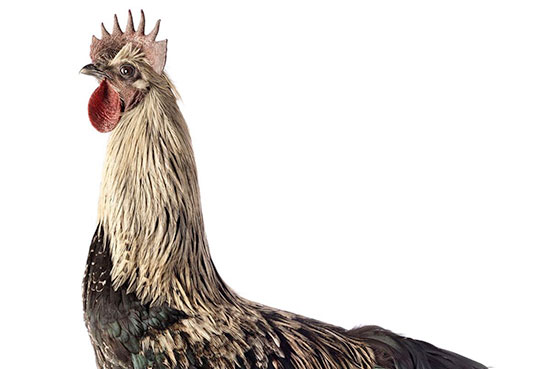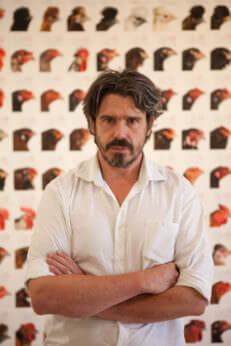Breeding a Better Chicken in the Name of Art (and Science)
For 20 years, Belgian artist Koen Vanmechelen has been selectively breeding chickens for his Cosmopolitan Chicken Project.
Breeding a Better Chicken in the Name of Art (and Science)
For 20 years, Belgian artist Koen Vanmechelen has been selectively breeding chickens for his Cosmopolitan Chicken Project.

For the last 20 years, Belgian artist Koen Vanmechelen has been selectively breeding chickens from around the world as part of his Cosmopolitan Chicken Project. What started as a way to illustrate metaphorical ideas about diversity and multiculturalism has led to the creation of a bird that, according to the artist and backed by the scientists working on the project with him, tends to be healthier, live longer, and be more adaptable to a changing environment than purebred chickens.
Vanmechelen has always had an affinity for chickens and began raising them as a child. But more than that, he has been obsessed with the way in which this bird – descended from the Asian red junglefowl – is so intertwined with humanity, not just because of its value as a food source, but also culturally. He says there are certain chicken breeds that can be seen as a representation of a nation’s culture, and gives the Poulet de Bresse from France, as an example. “The bird has red in the head, white in the body, and blue in the legs. It’s the French flag!” he says.

Vanmechelen launched the Cosmopolitan Chicken Project in 1996 when he began breeding his first hybrid, the Mechelse Bresse, a cross between the Belgian species Mechelse Koekoek and the French Poulet de Bresse. The bird was presented at a gallery on the border between France and Belgium three years later. Vanmechelen realized he was on to something and formed a foundation made up of experts in various fields, such as biology and genetics, including the geneticist Jean-Jacques Cassiman to collaborate on the project and study the birds. He typically breeds about a hundred of each generation and keeps some of his more than 3,ooo birds on a 25-acre farm near Meeuwen, Belgium, and the rest are scattered on various farms across the globe.
“Start telling people a chicken is a piece of art and watch how many friends you’ll still have after that,” says Vanmechelen with a laugh, during a recent Skype interview with Modern Farmer. That’s not to say his various exhibits around the world are just a bunch of chickens hanging out in a gallery space. Nope; they also incorporate Vanmechelen’s painting, drawing, photography, video, installations, and sculptures that have been inspired by the breeding project and vice versa.
Each successive generation of the Cosmopolitan Chicken is crossbred with a chicken breed from another country, and so far has included 20 nations, including the United States, Senegal, China, and Slovenia. Vanmechelen’s latest endeavor, which he launched this year and calls the Planetary Community Chicken, is a sort of spinoff of the original project and has a more direct real-world impact. When Vanmechelen realized his chickens have many superior traits, he came up with the idea of crossbreeding his roosters with commercial hens from various communities around the world in an attempt to bring more genetic diversity – and hopefully some of the positive traits from his chickens – to birds that can suffer from various problems and diseases. The idea is to produce a chicken could benefit local farmers. “I think of the Planetary Community Chicken as a gift to the different communities to make their own chicken that is suited to their particular environment,” says Vanmechelen.
On September 22, at Wasserman Projects in Detroit, the 20th iteration of the Cosmopolitan Chicken, the Mechelse Wyandotte, will be bred with a Hendrix Genetics’ ISA Brown, a commercial laying hen engineered for industrial-scale agricultural operations as part of an exhibit at the art space. Vanmechelen and Wasserman Projects are partnering with a local nonprofit, Oakland Avenue Urban Farm, to bring the hybrids into its breeding and sales operations. The exhibit, like Vanmechelen’s others, will include a variety of art related to the project.
And yes, collectors – besides buying Vanmechelen’s paintings, sculptures, and other artistic output – also collect his chickens. He says they have to agree to certain terms, such as how much space they must provide the chickens, before they are allowed to own one.
Koen Vanmechelen – Art and Science from Koen Vanmechelen on Vimeo.
Follow us
This work is licensed under a Creative Commons Attribution-NoDerivatives 4.0 International License.
Want to republish a Modern Farmer story?
We are happy for Modern Farmer stories to be shared, and encourage you to republish our articles for your audience. When doing so, we ask that you follow these guidelines:
Please credit us and our writers
For the author byline, please use “Author Name, Modern Farmer.” At the top of our stories, if on the web, please include this text and link: “This story was originally published by Modern Farmer.”
Please make sure to include a link back to either our home page or the article URL.
At the bottom of the story, please include the following text:
“Modern Farmer is a nonprofit initiative dedicated to raising awareness and catalyzing action at the intersection of food, agriculture, and society. Read more at <link>Modern Farmer</link>.”
Use our widget
We’d like to be able to track our stories, so we ask that if you republish our content, you do so using our widget (located on the left hand side of the article). The HTML code has a built-in tracker that tells us the data and domain where the story was published, as well as view counts.
Check the image requirements
It’s your responsibility to confirm you're licensed to republish images in our articles. Some images, such as those from commercial providers, don't allow their images to be republished without permission or payment. Copyright terms are generally listed in the image caption and attribution. You are welcome to omit our images or substitute with your own. Charts and interactive graphics follow the same rules.
Don’t change too much. Or, ask us first.
Articles must be republished in their entirety. It’s okay to change references to time (“today” to “yesterday”) or location (“Iowa City, IA” to “here”). But please keep everything else the same.
If you feel strongly that a more material edit needs to be made, get in touch with us at [email protected]. We’re happy to discuss it with the original author, but we must have prior approval for changes before publication.
Special cases
Extracts. You may run the first few lines or paragraphs of the article and then say: “Read the full article at Modern Farmer” with a link back to the original article.
Quotes. You may quote authors provided you include a link back to the article URL.
Translations. These require writer approval. To inquire about translation of a Modern Farmer article, contact us at [email protected]
Signed consent / copyright release forms. These are not required, provided you are following these guidelines.
Print. Articles can be republished in print under these same rules, with the exception that you do not need to include the links.
Tag us
When sharing the story on social media, please tag us using the following: - Twitter (@ModFarm) - Facebook (@ModernFarmerMedia) - Instagram (@modfarm)
Use our content respectfully
Modern Farmer is a nonprofit and as such we share our content for free and in good faith in order to reach new audiences. Respectfully,
No selling ads against our stories. It’s okay to put our stories on pages with ads.
Don’t republish our material wholesale, or automatically; you need to select stories to be republished individually.
You have no rights to sell, license, syndicate, or otherwise represent yourself as the authorized owner of our material to any third parties. This means that you cannot actively publish or submit our work for syndication to third party platforms or apps like Apple News or Google News. We understand that publishers cannot fully control when certain third parties automatically summarize or crawl content from publishers’ own sites.
Keep in touch
We want to hear from you if you love Modern Farmer content, have a collaboration idea, or anything else to share. As a nonprofit outlet, we work in service of our community and are always open to comments, feedback, and ideas. Contact us at [email protected].by Andrew Amelinckx, Modern Farmer
September 2, 2016
Modern Farmer Weekly
Solutions Hub
Innovations, ideas and inspiration. Actionable solutions for a resilient food system.
ExploreExplore other topics
Share With Us
We want to hear from Modern Farmer readers who have thoughtful commentary, actionable solutions, or helpful ideas to share.
SubmitNecessary cookies are absolutely essential for the website to function properly. This category only includes cookies that ensures basic functionalities and security features of the website. These cookies do not store any personal information.
Any cookies that may not be particularly necessary for the website to function and are used specifically to collect user personal data via analytics, ads, other embedded contents are termed as non-necessary cookies.